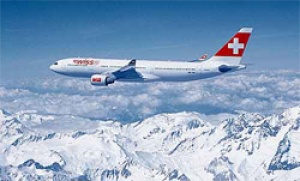SWISS reports a solid operating profit of CHF 368 million

After a challenging year, Swiss International Air Lines (Group) reports an operating profit of CHF 368 million for 2010. The result, which compares to a CHF 146 million operating profit for the previous year, was achieved despite earnings being depressed by some CHF 30 million through the volcanic ash cloud crisis, and despite a strong Swiss franc and rising fuel prices. Total income from operating activities amounted to CHF 4 774 million, a 9% improvement on 2009. SWISS generated an operating profit of CHF 135 million for the 2010 fourth-quarter period. The airfreight operations of Swiss WorldCargo made a substantial contribution to overall results, with the unit maintaining a consistently strong performance throughout the twelve-month period.
SWISS posted a seat load factor for the year of 82.3%, a new record for the company and indeed for Swiss aviation (seat load factor for 2009 amounted to 80.1%). The more than 14 million travellers carried in 2010 was also the highest passenger volume that the company has recorded since its foundation in 2002.
“2010 was a good year for SWISS,” says Chief Executive Officer Harry Hohmeister. “After a tough start to the year and the setback of the volcanic ash crisis, we were able to report an exceptionally strong second-half performance. We also saw increasing evidence that our consistent endeavours on the product and customer service fronts are reaping their rewards.”
Despite the encouraging results, Hohmeister is keen to emphasise the importance of maintaining business flexibility and cost discipline. “We must not ease up in our cost management,” he stresses, “and we must align all our actions and activities to a market that is likely to display increasing volatility – partly through external factors such as oil price and exchange rate trends, and partly through the market’s own innate developments, like customer bookings becoming increasingly short-notice and harder to predict. The recent events in the Maghreb region and in Japan dramatically underline the importance of flexibility.”
SWISS expanded its capacities by a modest 4.4% in 2010 – by 3.4% in Europe and by 4.9% on its intercontinental routes. The long-haul sector saw a recovery in demand from the levels seen in the immediate wake of the financial crisis. The Zurich-San Francisco route, newly operated from June onwards, showed favourable business volumes from the very first month. “We are delighted that we are clearly meeting a customer need here,” Hohmeister comments. “The load factors on the route are well above our expectations.”
ADVERTISEMENT
On the European network, however, which has seen a further tangible increase in competition from other carriers, yields have yet to recover from the levels seen in the crisis year of 2009. “In view of this, our European business remains the focus of further actions,” Hohmeister confirms. SWISS’s CEO is cautiously optimistic for 2011. “The year got off to a rather disappointing start,” he concedes, “and reliable projections are becoming harder and harder to make, given the increasing fluctuations we are seeing in our business. But we have every intention of emulating last year’s results.”
Added Felix Rodel, Director, UK & Ireland: “In the UK we have seen great success with the investment in our increased frequency of the London Heathrow – Geneva route in 2010. This route remains a key focus and will be fully operated with SWISS metal in 2011.“
“Given the high volatility of the markets, retaining our favourable cost structures is one of our paramount tasks,” adds Chief Financial Officer Marcel Klaus. “Flexibility, variability and speed of execution are the keys to sustainable corporate development.”
SWISS carried 14 168 718 passengers in 2010. The 2.8% increase on the 13 783 632 of 2009 was also the first time since it was founded that the carrier had transported more than 14 million passengers in a year. The additional capacity (which amounted to a 4.4% increase in available-seat-kilometre terms) was fully absorbed by the market: the systemwide seat load factor of 82.3% was the highest ever achieved in the history of Swiss air transport. Total flights operated saw a modest rise of 3.6% to 141 405. SWISS also welcomed its hundred-millionth passenger since its foundation on 19 October 2010.
Seat load factor on intercontinental services was raised from the 83.2% of 2009 to an extremely high 86.8%. While long-haul available-seat-kilometre (ASK) capacity was up 4.9% year-on-year, total revenue-passenger-kilometre (RPK) traffic volume rose by 9.5%. On the European network, ASK capacity was 3.4% above its prior-year level, while RPK volumes were increased by 2.6%. Seat load factor for Europe remained broadly unchanged at 73.5%.
The airfreight business of Swiss WorldCargo showed highly encouraging trends. Cargo load factor (by volume) for the year stood at 82.9%, an improvement of 12.2 percentage points on the 70.7% of 2009.
For the fourth quarter of 2010, SWISS raised its capacity by 9.5% systemwide (by 1.2% in Europe and by 14% on intercontinental routes) compared to the prior-year period. Some 3.59 million travellers flew SWISS during the October-to-December period, 2.1% more than in the fourth quarter of 2009. Cargo load factor (by volume) amounted to 82.8%, up 0.9 percentage points on the prior-year period.

